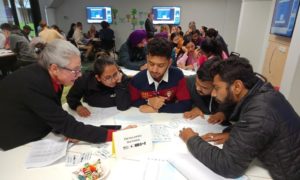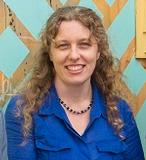
Dr Tully Barnett will discuss the effects of art and creativity on wellbeing in an upcoming forum, while other successes include a student summit that inspires and a new development screening tool gets a glowing review.
Student summit inspires

Taking inspiration from the upcoming Impact X summit being held in Sydney, two of Flinders University’s Geography and Environmental Studies lecturers – Professor Beverley Clarke and Professor Susanne Schech – have held a student summit for their topic GEOG3133 Adapting to Climate Change, with the aim to achieve a suite of policy initiatives to minimise greenhouse gas emissions and limit global warming.
Students were invited to take part in the summit, offering them to opportunity to practice their skills of negotiation and collaboration by experiencing real-world scenarios they might have at formal proceedings after graduating.
Students recognised the benefits saying, “The intensive literally gave me a feeling of participating in some new conference where we would be deciding a nations’ future.”
Forum examines Arts affecting wellbeing

The positive effects of art and creativity on mental health and wellbeing will be the focus of an Arts and Wellbeing Forum to be held on Friday 7 October, as part of WellFest Adelaide. The forum – which is being held from 9.30am to 1pm at Tandanya, in Grenfell St, Adelaide – will be led by a panel that will include Light ADL co-founder Sophie Dunstone and Flinders University Creative Industries Professor Dr Tully Barnett. It will also feature an artist appearance by Jennifer Trijo (creator of the Adelaide Fringe show Someday – A mindful cabaret) and a networking lunch.
Two pilot programs provided by the Caring Futures Institute at Flinders University in collaboration with Goodstart Early Learning and by Playgroup SA have been rolled out across 40 playgroups around SA to boost screening of children up to the age of five, with key checks at 12 and 18 months, as well as at two, three and four years old.
The increased screening will result in developmental delays being identified sooner, meaning kids and families can access services sooner if they need them.
The program has proven popular with adults and children alike, with one parent providing the following feedback to the project team.
“My 3 and 5 yo boys were assessed … as part of your improving outcomes project.
“I didn’t realise their assessment was today but at bedtime the 3yo bought it up. They both spent quite some time with excitement detailing their assessment and how fun it was. They described in detail their assessors who they thought were a nurse and researcher and were most pleased with the stickers they received.
“I hope your project goes well and just wanted to give you the child’s perspective of feedback on the project. I am … passionate in improving outcomes for children so applaud your work.”

